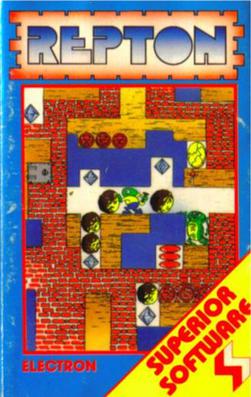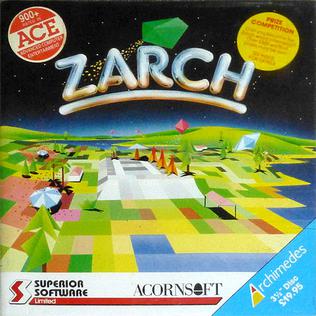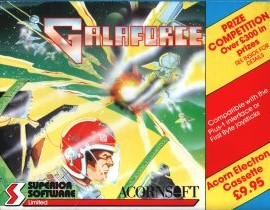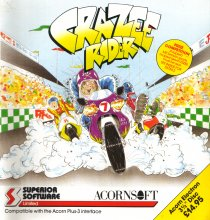
The Acorn Electron was a lower-cost alternative to the BBC Micro educational/home computer, also developed by Acorn Computers Ltd, to provide many of the features of that more expensive machine at a price more competitive with that of the ZX Spectrum. It had 32 kilobytes of RAM, and its ROM included BBC BASIC II together with the operating system. Announced in 1982 for a possible release the same year, it was eventually introduced on 25 August 1983 priced at £199.
Acornsoft was the software arm of Acorn Computers, and a major publisher of software for the BBC Micro and Acorn Electron. As well as games, it also produced a large number of educational titles, extra computer languages and business and utility packages – these included word processor VIEW and the spreadsheet ViewSheet supplied on ROM and cartridge for the BBC Micro/Acorn Electron and included as standard in the BBC Master and Acorn Business Computer.

Repton is a video game originally developed by 16-year-old Briton Tim Tyler for the BBC Micro and Acorn Electron and released by Superior Software in 1985. The game spawned a series of follow up games which were released throughout the 1980s. The series sold around 125,000 copies between 1985 and 1990 with Repton 2 selling 35,000 itself. The games have since been remade for several modern systems, including iRepton for the iPhone / iPod Touch in 2010, and Android Repton 1, Android Repton 2 and Android Repton 3 from 2016 to 2018.
The Acorn Business Computer (ABC) was a series of microcomputers announced at the end of 1983 by the British company Acorn Computers. The series of eight computers was aimed at the business, research and further education markets. Demonstrated at the Personal Computer World Show in September 1984, having been under development for "about a year" and having been undergoing field trials from May 1984, the range "understandably attracted a great deal of attention" and was favourably received by some commentators. The official launch of the range was scheduled for January 1985.

Tynesoft Computer Software was a software developer and publisher in the 1980s and early 1990s.

Artic Computing was a software development company based in Brandesburton, England from 1980 to 1986. The company's first games were for the Sinclair ZX81 home computer, but they expanded and were also responsible for various ZX Spectrum, Commodore 64, BBC Micro, Acorn Electron and Amstrad CPC computer games. The company was set up by Richard Turner and Chris Thornton. Charles Cecil, who later founded Revolution Software, joined the company shortly after it was founded, writing Adventures B through D. Developer Jon Ritman produced a number of ZX81 and Spectrum games for Artic before moving to Ocean Software.
Blue Ribbon was the budget computer software publishing label of CDS Micro Systems.

Zarch is a computer game developed by David Braben in 1987, for the release of the Acorn Archimedes computer. Zarch started off as a demo called Lander which was bundled with almost all releases of the Acorn Archimedes.

Electron User was a magazine targeted at owners of the Acorn Electron microcomputer. It was published by Database Publications of Stockport, starting in October 1983 and ending after 82 issues in July 1990.

Stryker's Run is a video game designed by Chris Roberts and Philip Meller for the BBC Micro and BBC Master which was published by Superior Software in 1986. It was also later converted to the Acorn Electron. It is a 2D side-scrolling action game. It was well received, particularly for its graphics.

Hunchback is a video game developed by Century Electronics and published in arcades in 1983. The game is loosely based on the 1831 Victor Hugo novel The Hunchback of Notre-Dame and the player controls Quasimodo. Set on top of a castle wall, the player must guide the Hunchback from left to right while avoiding obstacles on a series of non-scrolling screens. The goal of each screen is to ring the church bell at the far right.
Alligata Software Ltd. was a computer games developer and publisher based in Sheffield in the UK in the 1980s.

Pipeline is a video game for the BBC Micro and Acorn Electron, originally published by Superior Software in 1988. It is an overhead view action role-playing game set on a mining platform. It was remade for Microsoft Windows as Pipeline Plus (2004).

The British Broadcasting Corporation Microcomputer System, or BBC Micro, is a series of microcomputer designed and built by Acorn Computers Limited in the 1980s for the Computer Literacy Project of the BBC. Designed with an emphasis on education, it was notable for its ruggedness, expandability, and the quality of its operating system. The machine was the focus of a number of educational BBC TV programmes on computer literacy, starting with The Computer Programme in 1982, followed by Making the Most of the Micro, Computers in Control in 1983, and finally Micro Live in 1985.

Deathstar is multidirectional shooter for the Acorn Electron and BBC Micro developed by Peter Johnson and originally published in the UK by Superior Software in 1985. It is a clone of the arcade game Sinistar.

Galaforce is a fixed shooter video game for the BBC Micro and Acorn Electron, written by Kevin Edwards and published by Superior Software in 1986. It spawned a sequel, Galaforce 2 (1988), and later, Galaforce Worlds (2003).

Crazee Rider is a motorbike racing video game created by Kevin Edwards and published by Superior Software in 1987. It was released for the Acorn Electron and BBC Micro with an enhanced version for the BBC Master. The game was particularly well received for the Electron as it was the first 3D racing game with corners for that machine.
Gordon J. Key authored video game software for the Acorn BBC Micro, Electron and RISC OS platforms in the 1980s and 1990s. His most well-known works were published by The Fourth Dimension. He is also credited with additional programming routines in FedNet's futuristic flight combat game Star Fighter 3000 (1994), and authored Party Machine for the Amstrad CPC.














